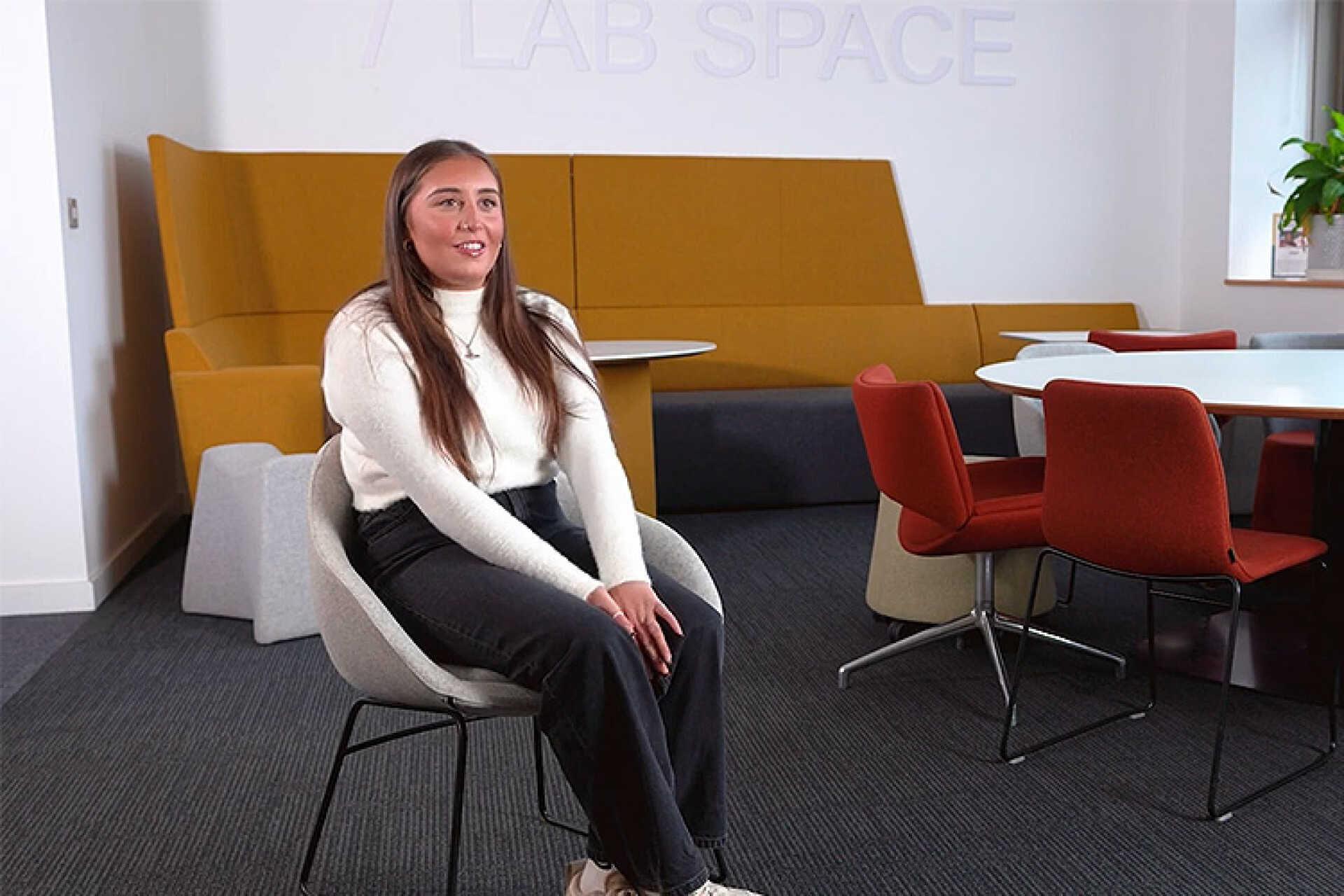Economics
with a Foundation Year
Develop the tools to analyse real economic problems and find solutions to societal and global issues.

Develop the tools to analyse real economic problems and find solutions to societal and global issues.
Examine some of today's profound pressing issues - poverty and development, environmental protection, and financial and monetary crises. In an era of Big Data, new technologies, and artificial intelligence, you can discover the solutions to shape your world.
By analysing real-world events and studying the principles of economics, you gain the skills and tools to make a difference in the world around you, and open doors to a variety of employment opportunities. Recent graduates have gone on to work for Deloitte, HMRC, Goldman Sachs, Barclays and more.
The foundation year offers students from a wide variety of educational backgrounds and age groups access to university education and prepares you for our BSc Economics (Hons) programme.

Meet some of our recent graduates, now working in banking and financial institutions.
Economics at Kent was ranked 17th for student satisfaction in The Complete University Guide 2024.

Gain real-world skills and experience with a professional placement.
Regular workshops, alumni talks, a peer mentoring scheme and a dedicated academic adviser.

Collaborate with inspiring lecturers who advise UK, European, and international organisations.
Our typical offer levels are listed below and include indicative contextual offers. If you hold alternative qualifications just get in touch and we'll be glad to discuss these with you. Please also see our general entry requirements.
DDD
MMP
72 Tariff points from your IB Diploma, Typically H4, H4, H4 or equivalent
N/A
The University will consider applicants holding T level qualifications in subjects closely aligned to the course.
The University welcomes applications from Access to Higher Education Diploma candidates will be considered on a case-by-case basis.
The following modules are what students typically study, but this may change year to year in response to new developments and innovations.
You take one of Mathematics for Economics Mode A or Mathematics for Economics Mode B, depending on your mathematics level, you then take all remaining compulsory modules.
Economics is the study of how we make choices about what to produce and consume, given our limited resources. Microeconomics explores the decisions made by individuals and firms, offering a fascinating lens through which to understand the world around us.
In this module, you'll learn to think like an economist, building and using models to answer economic questions. You'll develop critical thinking skills and learn how to evaluate models and integrate empirical evidence into your analyses. This is why microeconomics training, even at an introductory level, is useful in many jobs and walks of life. The emphasis in this module will be on how economics can help us understand the society we live in.
The module covers fundamental topics, such as demand, supply, and equilibrium. It also covers other topics related to real-world problems which are relevant to understanding human behaviour and society, including labour markets, strategic choices and inequality.
Macroeconomics is the study of the economy as a whole. It aims to explain topics such as inflation, unemployment, short-term fluctuations in GDP, and long-term economic growth. It analyses the aggregate behaviour of households, firms, and the government to understand how they collectively influence economic outcomes.
This module starts by introducing you to the measurement of GDP, inflation, and unemployment in an economy. It explains equilibrium in the market for consumer and investment goods and in financial markets. It then uses this knowledge to apply macroeconomic models to analyse the effects of government and central bank policy on outcomes like consumption, inflation, and unemployment. The macroeconomic analysis in this module uses mathematical and graphical representations of economic relationships which will support the narrative arguments.
You’ll learn to appreciate the close relationship between an economic argument and the underlying economic theory. You’ll also learn how different assumptions and theories can lead to different economic predictions. This module builds the foundation for macroeconomics in the second year and later macroeconomics-related optional modules.
Economists face a fundamental problem: we aim to describe in simple terms complex interactions that involve millions of very different actors such as households, businesses and policymakers. How can we make sense of what is happening and help others understand how the economy works? More importantly, what can we do about those aspects of the economy that aren’t working well? The answer is to use mathematics, which helps us comprehend complex problems.
This module has two aims. The first is to build your confidence and ability to understand the mathematical tools that economists use, such as linear algebra, differentiation, logarithms and exponentials. The second is to use economic applications to illustrate how mathematical economics differs from the textbook mathematics you will have studied at school. These applications will also show that even the simplest mathematical tools are powerful at explaining economic behaviour.
Mode A of this module is designed for students who already have a background in mathematics. It therefore focuses more on the applied part to develop your ability to think like an economist.
Economists face a fundamental problem: we aim to describe in simple terms complex interactions that involve millions of very different actors such as households, businesses and policymakers. How can we make sense of what is happening and help others understand how the economy works? More importantly, what can we do about those aspects of the economy that aren’t working well? The answer is to use mathematics, which helps us comprehend complex problems.
This module has two aims. The first is to build your confidence and ability to understand the mathematical tools that economists use, such as linear algebra, differentiation, logarithms and exponentials. The second is to use economic applications to illustrate how mathematical economics differs from the textbook mathematics you will have studied at school. These applications will also show that even the simplest mathematical tools are powerful at explaining economic behaviour.
Mode B of this module is designed for students who have not studied much mathematics at school. It therefore focuses on helping you build a solid foundation in mathematical methods.
One of the most important skills of an economist is the ability to routinely work with data and be the ‘numbers person’ for their team. By extracting the information that exists in the correlations between variables, we can test our theoretical models and identify the most useful ones, or make forecasts that can be used to help decision makers.
All these important components of the economist’s toolkit are rooted in statistics, a field that is becoming increasingly relevant and valuable in a world characterised by Big Data and machine learning.
This module introduces you to some of the fundamental concepts in statistics, such as probability distributions, sampling and inference, correlation and regression, all of which will form the foundation for other modules later in your degree. Most importantly, it gives you an insight into the practical questions and problems that statistics can solve. It will also teach you how to detect and understand the common ways in which statistics are misused and misinterpreted in everyday situations.
In today's data-driven world, mastering data analysis is vital for economists who want to gain meaningful insights and to inform decision making, both in government and the private sector.
This module provides you with a comprehensive toolkit of analytical techniques, tailored specifically for undergraduate economists, using the industry-standard software Excel.
Embark on a hands-on learning experience from day one. Through exercises and real-world case studies, you’ll harness Excel's functionalities to manipulate, analyse, and visualise economic data accurately. From mastering statistical techniques to crafting compelling graphics, this module empowers you to navigate economic analysis confidently.
You can apply the practical skills you learn in this module to both your professional and academic endeavours. Regardless of your background in Excel, this module is your gateway to driving impactful decisions in economics and will elevate your expertise in data-driven economics.
This is a hands-on module utilising experimental activities to interactively demonstrate how game theory and behavioural economics can shed light on significant economic and social issues.
You'll explore the exciting fields of game theory, experimental economics, and behavioural economics, gaining the essential tools to analyse individual and organisational interactions in economics, politics, and other social sciences. The module is structured to offer you strategic insights into the processes of decision-making and interaction within these areas. By integrating theoretical implications with experimental exercises, the module provides a comprehensive and engaging understanding of fundamental economic concepts, rendering these concepts accessible and applicable to real-life situations.
You'll delve into key topics such as the dynamics of market interactions, the common problems of principal-agent relationships, and the challenges of collective actions within economic contexts. Through this, you'll enhance your abilities and critical reflection to effectively tackle these challenges, particularly in the context of strategic decision-making in the real world.

It's so broad, which is something that I really enjoy – there are so many different aspects of economics to learn about.Karina Maheswaran
Why are some economies rich and others poor? How do investment and new ideas affect our living standards? Why do some occupations earn so much more than others? And why can’t the market find work for every jobseeker?
This intermediate module in macroeconomics focuses on medium to long-term economic outcomes including economic growth, employment, and inequality. Economic growth is the most important determinant of living standards in the long run, but it alone doesn’t necessarily improve living standards for all. Income distribution is also crucially important for ensuring widespread progress in living standards.
This module first analyses the long-term determinants of economic growth, including the role of investment in new capital, education, and new ideas. You’ll then analyse the labour market, exploring issues such as why some people who want to work are unemployed, and how different skills or occupations drive changes in economic inequality.
The study of economics is the study of human behaviour and decision-making. How do people make decisions regarding what to buy, how much to work, how much to save, or who to marry? What happens when people’s decisions depend on what they think other people will do? What happens when the outcomes of people’s actions are uncertain, or when people don’t have full information about the decisions in front of them? These types of decisions are important for the individuals making them – but also for the society as a whole because they affect overall wealth, inequality, and the environment.
In this module – which comprises the first half of an intermediate course on microeconomic theory – you’ll develop an analytical framework and toolkit for thinking about questions such as the ones above. The module introduces the fundamental theoretical foundations of microeconomics and provide examples of their application. In addition to consumer theory, other typical topics include game theory, choice under uncertainty, contract theory, altruism, and irrationality.
Are markets always the best method for delivering products and services? Are there scenarios in which government intervention can improve welfare? This module builds on and extends what you have learnt in previous microeconomics modules.
You’ll develop a deeper understanding of how companies make decisions and analyse how this behaviour is impacted by available production technologies, the level of competition in the market, the existence of externalities, and the characteristics of the goods to be produced.
You’ll examine market characteristics and the strategic aspects of individual decision making which may lead to market failures. This will provide insights into the types of government intervention that can improve market outcomes in real-world situations. These can include the reduction of anti-competitive behaviour, tackling environmental externalities, and ensuring efficient provision of public goods.
We’ll explore policy interventions which can move individual decisions towards more efficient outcomes, such as competition policy, taxes, and tradable permits. Additionally, we'll explore how societies, rather than individuals, can make collective decisions over resource allocation when preferences differ across the population, which is particularly relevant in the case of public goods.
What does an additional year of education bring in terms of future wages? Is the demand for trainers elastic or inelastic? In this module you will learn how to answer these and many other questions using economic data. Econometrics is a powerful tool that is employed to test economic theories, evaluate public policies or business strategies and forecast future outcomes.
Econometric techniques have proved crucial in business, allowing companies to evaluate their marketing and sales strategies and providing valuable forecasts for strategic planning. Rigorous data analysis often helps firms to make better-informed decisions and gain a competitive advantage.
Throughout this module you will learn how to conduct regression analysis, interpret the results and draw conclusions for business or public policy, therefore gauging the power of data for economic decision making. Additionally, you will be trained to use econometric software to perform your analytical work.
Macroeconomics II builds on the previous macroeconomics module and provides a comprehensive framework for understanding short-run fluctuations in economic activity. You’ll explore theoretical concepts and real-world examples, focusing on emergent policy implications. Through broadening your analytical skills, you'll be able to assess the key determinants of economic fluctuations and evaluate the range of policy responses to stabilise the economy when shocks happen.
You'll begin by examining business cycles. You’ll look at the alternating phases of expansion and contraction in economic activity, fluctuations in output, employment, and inflation. You’ll also learn about the regularity of business cycles, the asymmetry between recessions and expansions, and the variability of fluctuations across different economic indicators. A key part of your development is learning how and whether policymakers should respond to these fluctuations using monetary and fiscal policy. You’ll learn how to distinguish between demand and supply drivers of these fluctuations, and how the appropriate policy response differs in these two cases.
By the end of the module, you’ll discover how important it is to understand the behaviour of exchange rates in open economics, and how they both affect and are affected by macroeconomic policy. You’ll also examine in detail macroeconomic research on how to model economic agents’ expectations about the economy and the crucial contribution this has made in allowing us to understand how macroeconomic policy affects wages, prices and employment.
Economists invariably need to make assumptions to try to understand how the economy works. We can use mathematics to understand the link between these economic assumptions and their implications. Without using a clear mathematical framework, our assumptions can imply things we did not expect. We see this in some of the labour market examples we analyse such as monopsony power and efficiency wages.
The module is split into two parts, optimisation and dynamics. In optimisation, you'll use Lagrangians to solve problems with equality and inequality constraints. You'll consider the relationship between production functions, returns to scale and firm profitability, and also cover the duality theory of cost minimisation, and consumer theory. With dynamic systems, you learn to solve second-order difference equations, and, in so doing, learn about complex numbers. You can use this analysis to generate insights about monetary policy.
Both dynamic systems and optimisation draw on matrix algebra when analysing multiple-equation dynamic systems or working out when you have found a genuinely desired optimum. This understanding of matrix algebra also provides an important foundation for future studies in economics.
Economists have an abiding interest in providing an answer to what causes some countries to be poor and others rich. Is it the case that deep-rooted factors such as geographical endowments, institutions, culture, and human diversity are pivotal in determining long-run economic development? Do these factors interact with each other in furthering development? Can history be used as a medium through which to analyse the effect of these factors, and their interactions, on economic development? You’ll study some of the answers that have been proposed to these fundamental questions. In doing so you will engage with cutting-edge research in comparative development that examines the historical roots of contemporary economic performance. You’ll also gain an understanding of the empirical methods and data sources that such research employs. Ultimately, the module is designed to immerse you in an ‘inclusive approach’ to teaching economic history that encompasses diverse growth experiences from across the world, with particular emphasis on the Global South.
What kind of questions are economics researchers currently interested in? How do we tackle these questions? How does economic research feed into policy. What are the upsides and downsides of different approaches used? How can contradictory findings be reconciled? The eight teaching weeks will be split into four topics, each will start with a non-technical introduction to the paper(s) and their findings. Then knowledge and understanding of the paper and the skills to evaluate it will come from both lectures and interactive workshops. Understanding and evaluative skills will be assessed through moodle quizzes and group presentations. The final piece of assessment will be an individual project based on a topic of choice.
How do cognitive biases influence economic decision-making and outcomes? What role do emotions and heuristics (mental shortcuts) play in economic decision-making? How do they sometimes lead to sub-optimal choices? How can behavioural economics principles be used to improve the design of programmes and policies? You're introduced to behavioural economics, which combines economic analysis with insights from psychology, to understand human behaviour. Begin with a brief presentation of the classical model of rational, selfish economic agents, outlining limitations of this model in predicting and explaining behaviour. You'll move on to models which relax assumptions of the classical model, incorporating insights from psychology instead and cover evidence on the power of these behavioural models in explaining human behaviour. Finally, you'll cover the implications of these models for the design of public policy. Alongside formal lectures, workshops and the assessments are designed to develop academic research skills and the ability to communicate ideas verbally and in writing.
Building on the second-year econometrics module, this module emphasises the wider application of econometric estimation and model-building, guided by real economic empirical situations. You’ll get an introduction to time series and panel data econometrics and the challenges that present themselves when analysing economic data.
Traditional econometric techniques such as Ordinary Least Squares (OLS) are poorly suited for the estimation of economic models or data which exhibit time and cross-sectional processes. This module introduces you to new econometric methods that are suitable for analysing such data. You’ll be exposed to current applied examples from various empirical situations from macroeconomics, finance, health and labour economics, where time series and panel data are widely used. Through this you'll make rapid progress in understanding how to apply econometrics, a valuable skill that makes you stand out to employers.
What are the essential practical skills you need to succeed in the world of finance? This module explores this question in three sections.
To successfully complete this module, you’ll be expected to demonstrate theoretical knowledge as well as be able to apply the concepts you learn to actual data.
Time-series econometrics is an important tool for economists, with vital applications in empirical macroeconomics and finance. The central objective of this module is to equip you with essential skills in effective forecasting, which is crucial for policymakers in institutions like central banks. The Bank of England, for example, relies on accurate forecasting to maintain a 2% inflation target for price stability.
You’ll learn forecasting principles and techniques, including ad hoc forecasting, autoregressive moving average (ARMA) models, ARCH/GARCH volatility modelling, and advanced methods like big data and machine learning. Additionally, you’ll explore state-space and VAR models. Teaching includes hands-on practical exercises using specialised software for pseudo-out-of-sample forecasting, with no prior knowledge of such software required.
The curriculum addresses real-time macroeconomic data release, providing insights for policymakers. After completing the module, you’ll be well-prepared to independently conduct forecasting and empirical research in both macroeconomics and finance, using your skills in real-world economic analysis and policymaking.
What advanced tools do economists use to estimate causal effects and deal with endogeneity and spurious regressions in leading economic applications? This module equips you with the latest econometric tools and explores topics such as micro-econometrics, empirical macroeconomics, and simulation-based methods. You’ll learn to choose an appropriate methodology for your economic question as well as to critically evaluate existing empirical findings from recent economics literature.
You’ll be exposed to econometric methods such as instrumental variables, pooled-OLS, fixed and random effects models, cointegration methods, difference-in-differences and simulation-based methods. You’ll discuss the technical aspects of each method and evaluate them alongside examples from empirical economics including seminal research papers stemming from demand and supply estimation, health economics, macroeconomics and labour economics.
Practical sessions and hands-on exercises using specialised software will provide you with the necessary skills to apply advanced econometric techniques. After completing the module, you’ll be prepared to investigate important and intriguing empirical questions that are relevant to current economic policy.
What are the causes and effects of booms and recessions in economic activity? How can policy respond to fluctuations in the macroeconomy to stabilise the economy? What can we learn from past recessions for future economic policy?
This specialist macroeconomics topic focuses on the short-run behaviour of the macroeconomy, as opposed to economic growth or international macroeconomics. You’ll study inflation, unemployment and short-run output fluctuations. You’ll analyse macroeconomic policy tools to control short-run economic outcomes. Gain an understanding of short-run macroeconomic issues and available policy tools and how to use macroeconomic models in order to rationalise observed macroeconomic data. This set of skills is crucial and gives you a real edge in the job market where your ability to contextualise economic policy changes and interpret data is in high demand.
Through combining aspects of environmental economic and green finance with knowledge of mathematical and statistical methods, you’ll be on your way to understanding the link between theory and policy application.
You’ll be introduced to fundamental key skills used by environmental economists in the application of economics to real world environmental issues and will understand how economic theory can be translated into practical policy advice. To demonstrate the link between theory and applied settings you’ll use appropriate software such as Excel and R, continuing your development in using information technology within a structured environment.
You’ll consider a variety of practical environmental economic and green finance issues. Alongside formal lectures, computer workshops and seminars are designed to develop academic research skills and the ability to communicate ideas both verbally and in writing. This gives you the full toolset you need to stand out to employers and make informed decisions in environmental economics.
This is your opportunity to conduct, document, and convey an original piece of economic research. The focus of this module, which is worth 20 credits, is to use either primary or secondary data to test a hypothesis and subsequently interpret the findings.
Previous students have explored diverse research questions, such as gender inequality, shrinkflation, growth patterns within and across countries, child development, and whether or not people are willing to pay for environmental public goods.
This is an excellent way to prepare for further studies in economics and equips you for workplace projects where solving specific problems is a requirement. Your work is not only a way to see how far you have come during your degree programme, it is a fantastic example of your knowledge, skills and confidence to show employers after graduation.
Economics is more interconnected than ever before. So an understanding of international economics is crucial to operate across borders in both business and government,
Focused topics in international trade include the analysis of the effects of trade on economic development, policy debates, and the role of international trade in shaping economic outcomes at both the micro and macro levels. Through consideration of the key concepts of international finance, such as the balance of payments, exchange rates, and the impact of globalisation on current account and macroeconomic policies, you’ll gain a solid understanding in the theoretical underpinnings and practical aspects of monetary and financial relations between countries and enhance their abilities to analyse trade-related issues.
By studying trade and finance topics, you’ll gain a comprehensive overview of the global economic environment. You’ll be equipped with the analytical frameworks and institutional knowledge necessary to engage effectively with international economic issues, preparing you for careers with an international outlook.
Understand a variety of economic growth issues from both empirical and theoretical perspectives.
After exploring historical and modern statistics you’ll learn about the core theories of economic growth. Building on the insights from the core theories of growth and empirical observations, You’ll consider key growth questions. What are the determinants of economic growth? Can we sustain long-run economic growth by just investing in machines and why is it essential to have productivity growth to sustain long-run growth in the standards of living? Why are some countries more productive than others? Can the lack of knowledge of modern production processes be the whole answer? What roles do management practices and allocation of economic resources to different uses play in productivity differences across countries?
Through exploring these key questions, you'll come to understand economic growth from all angles, meaning you are able to suggest policy and improvements to help drive economic growth.
Game theory is a theoretical framework for conceiving social, economics and business situations among competing players. It is the science of strategy, or at least the optimal decision-making of independent and competing actors in a strategic setting. The curriculum is enriched with Game theory and is used in various fields to lay out various situations and predict their most likely outcomes. Businesses may use it, for example, to set prices, decide whether to acquire another firm, and determine how to handle a lawsuit.
You’ll study the main equilibrium concept, the Nash equilibrium, and it’s several refinements under different types of games, guiding students thorough the analysis of strategic choices in a variety of game structures, from cooperative engagement to competitive stand offs. A number of different scenarios and examples will be considered to explain how strategic decision making plays a role in solving every-day problems.
The strategic interaction between firms and the dynamics of competition between them in different markets are both interesting from a theoretical point of view and important from an applied policy perspective. What competitive weapons do firms use? Which strategies can firms use to soften competition To what extent are mergers driven by efficiency or by market power considerations?
You’ll be encouraged to ask the question of when, and how, the government should intervene to facilitate the competitive process. Study the theories that are key to understanding firm strategies and the basis for regulatory intervention. You’ll approach issues that are present in everyday news such as anti-competitive practices, the effect of market power on consumer welfare and the incentives for product innovation, private and public effects of mergers. You will have the chance to discuss and understand many of these topics in a more structured and economically informed way, so you can suggest new approaches and improvements to industrial economics and government intervention.
Why are living standards in some countries so much higher than in others? How did they get that way, and what can be done to promote growth and improve livelihoods in poorer countries? We will engage with these questions as well as some of the answers that have been proposed.
You'll study the structure of poor economies and the behaviour of individuals, firms and governments within them. Focus will be placed on providing a strong theoretical background for understanding these issues and engaging with data and modern empirical techniques that are commonly used by development economists when conducting research. This knowledge of development economics will help you in looking to drive growth to developing countries in a sustainable way, in order to improve living conditions for those in the countries.
This is your introduction to the topic of political economy using microeconomic analytical tools. The idea that economic policy in any country or even internationally is a product of not just economic rationale but also of ambient political realities will be explored in a variety of settings.
You’ll gain an overview of microeconomic theories and current empirical methods that have been used to bring new insights to issues related to political economy. There will be an emphasis on connecting theoretical models to observed empirical findings and evaluating the analytical rigour of both aspects in different contexts. You’ll also explore how these issues relate to themes in development, public and environmental economics. By understanding political economics, you will be better able to evaluate different global approaches to economics from different nations, allowing you to operate more effectively in a global marketplace and across borders.
Public expenditure accounts for a large fraction of the economy and has a major impact on its functioning. You’ll be introduced to the theories that allow us to analyse the economic role played by the state. Use the tools of microeconomics and empirical analysis to study the impact of government policies on individual behaviour and the distribution of resources in the economy.
You’ll explore the economic arguments for and against government intervention in the economy and take on insights from behavioural economics into the analysis and design of public policies. You’ll also review literatures on relevant and timely policy issues. This will allow you to find your own views within the debate and effectively suggest improvements to theory or policy in order to drive economic growth and stability.
Delve into how decisions by individuals, families, and households impact and are impacted by the distribution of wages, employment, and opportunities. Scrutinize inequalities among men and women, social classes, and ethnic groups, considering the role of policies and institutions in shaping these dynamics. The field also explores the intricate relationship between the world of work and the macroeconomic performance of the economy, providing insights into trends in the distribution of welfare within and across countries.
You’ll explore areas of topical interest and importance that will cover the main insights of and approaches taken by researchers in the field. Theoretical issues, empirical evidence and questions of policy are considered, drawing on research covering a range of OECD countries. A key focus will be on the discussion and evaluation of data and research. You will gain an understanding of how the world of work effects households and families as well as the tools to help you evaluate both research and policy. You will be able to synthesise information from various sources and present findings to diverse audiences, giving you the skills, knowledge and confidence you need to launch a career in economics.
Our modules are taught by a combination of lectures and small group sessions, which include cohort workshops, practical sessions, engaging lectures, interactive seminars, and personalized individual consultation and supervision.
We are committed to making sure that you leave Kent with much more than just a degree in Economics. We put great emphasis on the development of transferable skills, including numeracy, analytical problem solving, data analysis, and written and oral communication, as well as subject-specific skills for further study at postgraduate level.
Some modules are assessed by continuous assessment of coursework throughout the year and an end-of-year exam in the final term. A number of modules at each stage are assessed solely through coursework.
For a student studying full time, each academic year of the programme will comprise 1200 learning hours which include both direct contact hours and private study hours. The precise breakdown of hours will be subject dependent and will vary according to modules.
Methods of assessment will vary according to subject specialism and individual modules.
Please refer to the individual module details under Course Structure.
For course aims and learning outcomes please see the course specification.
Our Economics graduates have excellent prospects, and we are committed to helping you achieve success.
Economists are in great demand in business, banking and finance, consultancy, the public sector, as well as in international institutions. Some of the top employers for Kent Economics graduates include:

*The Government announced on 4 November 2024 that tuition fees in England for Home students will increase to £9,535 from £9,250 for the academic year 2025/26. This increase requires Parliamentary approval, which is expected to be given in early/mid 2025.
Tuition fees may be increased in the second and subsequent years of your course. Detailed information on possible future increases in tuition fees is contained in the Tuition Fees Increase Policy.
The University will assess your fee status as part of the application process. If you are uncertain about your fee status you may wish to seek advice from UKCISA before applying.
For details of when and how to pay fees and charges, please see our Student Finance Guide.
Students will require regular access to a desktop computer/laptop with an internet connection to use the University of Kent’s online resources and systems. Please see information about the minimum computer requirements for study.
Find out more about accommodation and living costs, plus general additional costs that you may pay when studying at Kent.
Kent offers generous financial support schemes to assist eligible undergraduate students during their studies. See our funding page for more details.

We have a range of subject-specific awards and scholarships for academic, sporting and musical achievement.
We welcome applications from students all around the world with a wide range of international qualifications.

Student Life

Powered by progress
Kent has climbed 12 places to reach the top 40 in The Times Good University Guide 2025.
Kent Sport
Kent has risen 11 places in THE’s REF 2021 ranking, confirming us as a leading research university.

An unmissable part of your student experience.